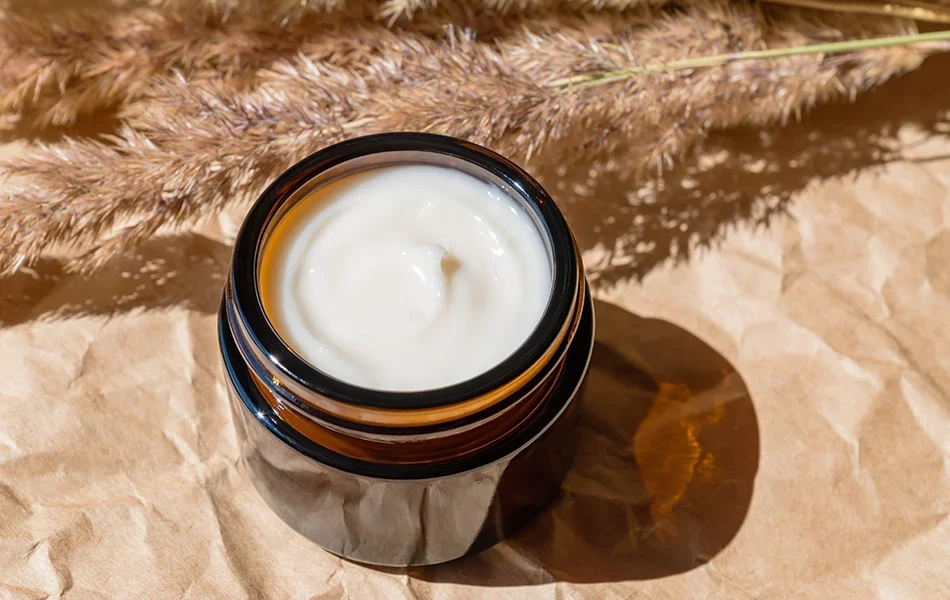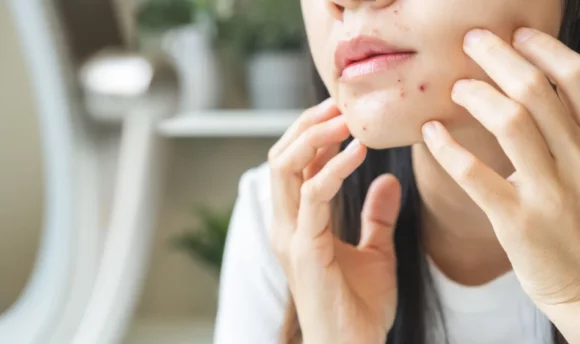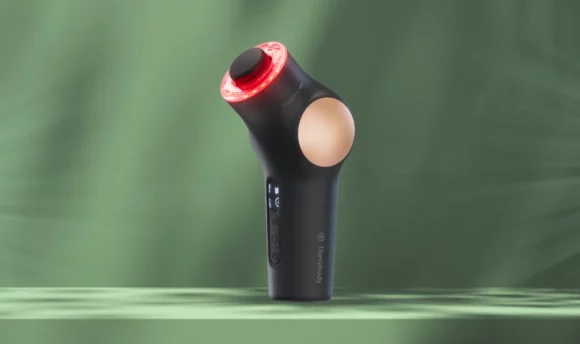Do Collagen Creams Work or Is It Just Another Skincare Fad?
As we age, collagen production in the body slows down, which can leave our skin looking saggy, thin, and wrinkled. From creams to supplements, there are many products on the market that claim to restore collagen production and boost our skin health. Are collagen creams one of them?

If you’ve scrolled through social media or taken a trip to your local health and beauty store lately, you’ve probably noticed the large number of collagen products popping up everywhere.
As a structural protein, there’s no doubt that collagen has several advantages for healthy skin, helping it to feel hydrated, appear plumper, and look more youthful. But will applying collagen cream to your face provide these benefits, or is it just an expensive fad?
Find out what collagen creams are, how they work, and whether you should make the investment.
Do Collagen Creams Work? Not As Much as You Would Hope
While collagen supplements can repair your skin’s connective tissues, collagen creams don’t tend to work because they’re only applied to the skin’s outer layer. This outer layer, known as the epidermis, is made up of dead skin cells.
Applying a cream to these dead cells will not revitalize them, and instead of helping your body produce more collagen, the peptides will just sit on top of the epidermis. Creams also wash off when you shower or wash your face.
So while they may help your skin feel softer, collagen creams do not have the same benefits as taking the protein orally, which can help stimulate collagen production in the body.
What Is Collagen?
Found primarily in the skin and other connective tissues, collagen is a structural protein in the body. Made up of amino acids, collagen is produced in the dermis, the second layer of skin below the epidermis. Most of your skin’s supply of the protein is found here.
Collagen can also be produced by plants and animals and is often added to supplements that are taken orally or to cosmetic products that are applied to the skin.
There are a variety of collagen types, including those from cows (bovine), marine from fish, poultry from chicken, and egg membrane collagen.
Research shows that collagen helps to improve skin hydration, elasticity, and roughness, therefore keeping it looking and feeling healthy.
How Do Collagen Creams Work?
After the age of 20, collagen stores within the body begin to decrease by around 1% per year, which can leave your skin looking old and wrinkled. Collagen creams are designed and marketed to combat the signs of aging.
Like a standard moisturizer, these creams are applied topically to the skin. They contain hydrolyzed collagen peptides, a form of collagen that is broken down into smaller particles. These particles are more easily absorbed into the skin than bigger collagen molecules.
Can your skin absorb collagen?
Collagen is structured like a rope or braid, with individual amino acids linked together to form long, bundled chains that look like thick strands. It is, therefore, a complex molecule that is too large to penetrate the epidermis or be absorbed into the dermis underneath.
As we’ve mentioned before, many brands include hydrolyzed collagen peptides in their creams to avoid this problem. While these peptides can be absorbed into the skin, there is little clinical research to suggest that this will cause your skin to produce more collagen.
Benefits of Collagen for Skin
Although creams may not be effective, as a structural protein, collagen has many benefits for building healthy nails, hair, and skin. Below is a list of the main benefits of collagen in preventing premature skin aging:
- Increases the flow of blood and nutrients to the skin
- Supports skin structure to fill in wrinkles and fine lines
- Boosts skin elasticity
- Hydrates skin to reduce dryness and add softness
- Increases skin density by thickening the dermis and epidermis layers
Possible Side Effects of Collagen
Collagen creams don’t necessarily have miraculous effects on your skin, but they are mainly safe to use.
However, if you have any allergies, it’s important to find out how the collagen within the cream or supplement you’re using is produced. For instance, if you’re allergic to cow’s milk, avoid using collagen derived from a cow.
Some reported side effects of collagen supplements include nausea and bloating, but there is little evidence to support them being widespread. Be sure to stick to the recommended dose on the supplement’s packaging to avoid taking too much collagen.
7 Other Ways to Restore Collagen in Your Face
Creams are the least effective way to boost collagen stores, but there are other treatments, methods, and collagen products that can help restore your skin’s health. Read on to discover 7 other ways you can get collagen.
#1 Collagen-rich foods
Although you can boost your skin’s collagen production through various treatments and supplements, you may be surprised to learn that you’re probably already eating a number of foods that contain collagen themselves.
Collagen is generally found in foods that are high in protein, including meat, eggs, dairy products, beans, and tofu. If you include a variety of these options in your diet, it’s likely that you’re getting your daily dose of collagen without the need for a supplement.
#2 Collagen supplements
Collagen supplements are a type of dietary supplement that comes in various forms, including pills, powders, bars, and even drinks. They are typically made from the skin, bones, or connective tissues of animals, but there are some plant-based collagen alternatives available.
Studies have shown taking collagen peptides orally can help improve skin hydration and elasticity as well as reduce the appearance of wrinkles.
#3 Microneedling
Also known as collagen induction therapy, microneedling is a cosmetic procedure that involves inserting small needles into the skin or the scalp for hair growth. Mainly used on the face, the treatment generates new collagen within the skin tissue to help tone, firm, and smooth your skin.
Microneedling is a minimally invasive procedure that is safe for most people with good health. However, consult your doctor before going ahead with the treatment if you have acne, psoriasis, eczema, or a low immune system, as it may not be safe in these cases.
#4 PRP therapy
As well as being used for hair loss, platelet-rich plasma (PRP) therapy helps regenerate your skin’s collagen, which reduces wrinkles and provides you with a youthful glow.
The procedure is conducted by taking a small amount of your blood before separating the platelets from the rest of your blood. The blood that contains a high concentration of platelets will then be reinjected.
#5 Dermal and facial fillers
Injectable fillers stimulate your cells to produce more collagen to keep skin firm and youthful. They do this by filling fine lines and wrinkles in areas that have lost elasticity due to aging while also drawing water to the collagen molecule.
This helps to keep skin plump and hydrated.
#6 Skin resurfacing lasers
Laser resurfacing rejuvenates your skin by removing the thin outer epidermis layer while heating the underlying dermis.
As the epidermis heals, this helps stimulate collagen growth to treat an uneven skin tone and help the affected area appear tighter and smoother.
#7 Chemical peels
Similarly to laser treatment, chemical peels remove the skin’s epidermis layer to reveal fresh, newer skin underneath. This encourages a collagen response, as the new skin isn’t yet completely formed and is irritated from the procedure.
FAQs
Topical collagen creams may help your skin to feel softer and smoother, but they are unlikely to prevent the signs of skin aging, including wrinkles, fine lines, and sagging.
Yes, collagen creams can be used every day, in the morning and the evening.
Serums work in a similar way to creams, meaning that when applied topically, the collagen within them will struggle to penetrate the skin. This means that they don’t work to promote collagen production.
A Word From a Dermatologist
As a protein, collagen is essential for building bone, skin, muscle, nail, and hair tissues.
However, there is little evidence to suggest that applying topical collagen creams helps to maintain good skin, as they cannot penetrate the first layer. They also do not increase the production of collagen. However, they can help to keep your face feeling soft and moisturized.
One way of stimulating collagen production is by adding cosmetics that contain retinol (vitamin A), niacinamide (vitamin B3), and vitamin C to your skincare routine.
Along with aging, there are a number of other reasons that your collagen production may be slowing down. To keep your skin, hair, and nails looking healthy and youthful, it’s therefore important to quit smoking, reduce the amount of alcohol you drink, and wear sunscreen to protect against UV rays.
If you’re still not sure how to combat the side effects of collagen depletion or are looking for more ways to minimize wrinkles, see a dermatologist. They can advise you on which products to use for your specific skin type.
Conclusion
Unfortunately, collagen creams have not been proven to stimulate collagen production in the skin. This is because the molecules have a hard time penetrating the outer layer and instead sit on the surface of your skin before being washed away.
If you are hoping to help your skin feel healthier and more youthful, you may want to consider taking oral collagen supplements. There is evidence that they can help boost the skin’s collagen stores, which often diminish with age and exposure to environmental pollutants.

















































 Select your language:
Select your language: 








